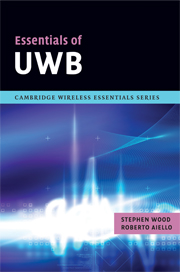Book contents
- Frontmatter
- Contents
- 1 Introducing ultra-wideband (UWB)
- 2 Matching UWB to HDR applications
- 3 Physical-layer (PHY) characteristics
- 4 Media-access control (MAC) layer
- 5 Implementation information
- 6 Upper-layer protocols
- 7 Ultra-wideband standardization
- 8 Special-interest groups
- 9 Ultra-wideband business issues
- 10 Regulating ultra-wideband
- 11 Tragedy of the commons
- Appendix: Reference documents
- Author biographies
- Index
11 - Tragedy of the commons
Published online by Cambridge University Press: 22 August 2009
- Frontmatter
- Contents
- 1 Introducing ultra-wideband (UWB)
- 2 Matching UWB to HDR applications
- 3 Physical-layer (PHY) characteristics
- 4 Media-access control (MAC) layer
- 5 Implementation information
- 6 Upper-layer protocols
- 7 Ultra-wideband standardization
- 8 Special-interest groups
- 9 Ultra-wideband business issues
- 10 Regulating ultra-wideband
- 11 Tragedy of the commons
- Appendix: Reference documents
- Author biographies
- Index
Summary
When a property is owned by a single person or entity, it is the responsibility of that person to maintain the property in good condition. If he or she fails to do so, it is entirely to his or her own disadvantage. The value of the property will decline. Likewise, any profit that may be derived is solely to the benefit of the property owner. The owner is therefore motivated to manage the property in a manner that optimizes its profitability.
If a property is communally owned and the individuals are not closely associated with one another, the incentives change. The individuals involved will each attempt to maximize their own personal profit from the property while attempting to minimize their contribution to the upkeep and maintenance. The property becomes overused, while at the same time maintenance is neglected. The value of the property goes into a downward spiral. This behaviour is known in regulatory circles as ‘the tragedy of the commons’ and is frequently used to describe potential risks of unlicensed spectrum. More specifically, this describes spectrum wherein anybody is able to build devices which operate without the enforcement mechanisms that manage use.
Ultra-wideband spectrum saturation
Ultra-wideband is an unlicensed spectrum of this type. Ultra-wideband is somewhat different in considering spectrum saturation than longer-range technologies. The fact that its power is so strictly limited reduces the number of devices that might cause interference to UWB as well as the number of devices that it might interfere.
- Type
- Chapter
- Information
- Essentials of UWB , pp. 187 - 193Publisher: Cambridge University PressPrint publication year: 2008



